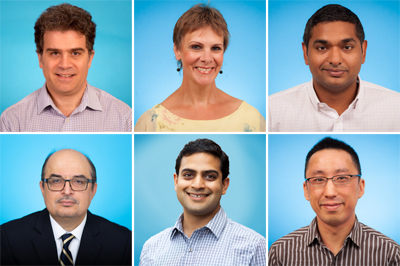Three projects led by St. Michael’s researchers awarded Collaborative Health Research Project funding

By Ana Gajic

Left to right, from top row: Drs. Michael Kolios, Flora Matheson, Fahad Razak, Alireza Sadeghian, Amol Verma and Darren Yuen
Three projects led by researchers from St. Michael’s Hospital have received funding through the Collaborative Health Research Project (CHRP) funding from the Canadian Institutes for Health Research the Natural Sciences and Engineering Research Council of Canada (NSERC) and the Social Sciences and Humanities Research Council of Canada (SSHRC).
The CHRP initiative supports innovative, interdisciplinary and collaborative research projects. This funding requires participation from the natural sciences or engineering community together with the health sciences community, focusing on the translation of research results to stakeholders. The funded projects have a strong focus both on knowledge translation and health and economic benefits for Canadians.
Twenty-nine projects from across Canada have received these grants, including three led by St. Michael’s researchers. This opportunity to collaborate with engineering aligned especially well with the partnership between Ryerson University and St. Michael’s through the Institute for Biomedical Science, Engineering and Technology (iBEST). Two projects led by St. Michael’s are collaborations between Ryerson and the hospital.
Self-management in the age of complexity: An eHealth tool to support people experiencing problem gambling, poverty & homelessness
Led by Dr. Flora Matheson, scientist at the MAP Centre for Urban Health Solutions; Dr. Alireza Sadeghian, theme lead for the Healthcare Analytics & Applications theme at iBEST; and Aklilu Wendaferew from Good Shepherd Ministries
The prevalence of problem gambling (PG) among low income persons in Canada is up to 9 times higher than within the general population. This project aims to create a free and first-of-its-kind Smartphone/web app to help persons in vulnerable populations self-manage problem gambling and other complex needs. By collecting client information, the app will be able to detect potential crisis situations and push supportive content to the user, such as an option to connect with social supports, a reminder of a PG-related goal or other resources such as self-help materials, gambling facts and motivational quotes.
Using artificial intelligence to identify and predict delirium among hospitalized medical patients
Led by Dr. Fahad Razak and Dr. Amol Verma researchers at the Li Ka Shing Knowledge Institute and internists at St. Michael’s; Anna Greenberg, vice-president of Health System Performance at HQO; Timothy Chan, associate professor in the Department of Mechanical and Industrial Engineering at the University of Toronto; Mark H. Chignell, professor of Industrial Engineering at the University of Toronto; Sanja Fidler, professor in the Department of Computer Science at the University of Toronto; Marzyeh Ghassemi, assistant professor in Computer Science and Medicine at the University of Toronto; Dr. Kathleen Sheehan, staff psychiatrist at UHN; Arjumand Siddiqi, associate professor at the Dalla Lana School of Public Health.
Delirium is an acute neurocognitive disorder which affects up to half of older hospitalized medical patients. This project aims to use artificial intelligence to develop two automated tools, which will use routine data extracted from electronic medical records to identify delirium cases and predict patient delirium risk. As there is concern that AI applications may worsen health inequity because they do not take into consideration social and economic variables, the team will test whether there is bias in the detection and prediction of delirium with the two new tools. This approach is novel in delirium care and healthcare quality improvement more generally, and could change how quality indicators are measured.
Using “enhanced ultrasound” to help select the best kidneys for transplantation
Led by Dr. Darren Yuen, researcher at the Keenan Research Centre for Biomedical Science and nephrologist at St. Michael’s; Dr. Michael Kolios, co-director of iBEST, and Andrew Needles
Transplantation has revolutionized the lives of patients with kidney failure, being the only therapy that prolongs life span and improves quality of life. There is a need for accurate tools to assess the degree of chronic injury in potential transplant kidneys, and that predict how well these kidneys will function in the long term. This project aims to develop new cutting-edge ultrasound-based techniques to measure scarring and blood vessel damage in transplant kidneys. The team’s ultimate goal is to help doctors better select kidneys for transplantation, and thus improve kidney transplant outcomes.
- See the full list of all recipients of this round of CHRP funding.
About St. Michael’s Hospital
St. Michael’s Hospital provides compassionate care to all who enter its doors. The hospital also provides outstanding medical education to future health care professionals in more than 27 academic disciplines. Critical care and trauma, heart disease, neurosurgery, diabetes, cancer care, care of the homeless and global health are among the Hospital’s recognized areas of expertise. Through the Keenan Research Centre and the Li Ka Shing International Healthcare Education Centre, which make up the Li Ka Shing Knowledge Institute, research and education at St. Michael’s Hospital are recognized and make an impact around the world. Founded in 1892, the hospital is fully affiliated with the University of Toronto.
About Unity Health Toronto
Unity Health Toronto, comprised of Providence Healthcare, St. Joseph’s Health Centre and St. Michael’s Hospital, works to advance the health of everyone in our urban communities and beyond. Our health network serves patients, residents and clients across the full spectrum of care, spanning primary care, secondary community care, tertiary and quaternary care services to post-acute through rehabilitation, palliative care and long-term care, while investing in world-class research and education. For more information, visit www.unityhealth.to.
